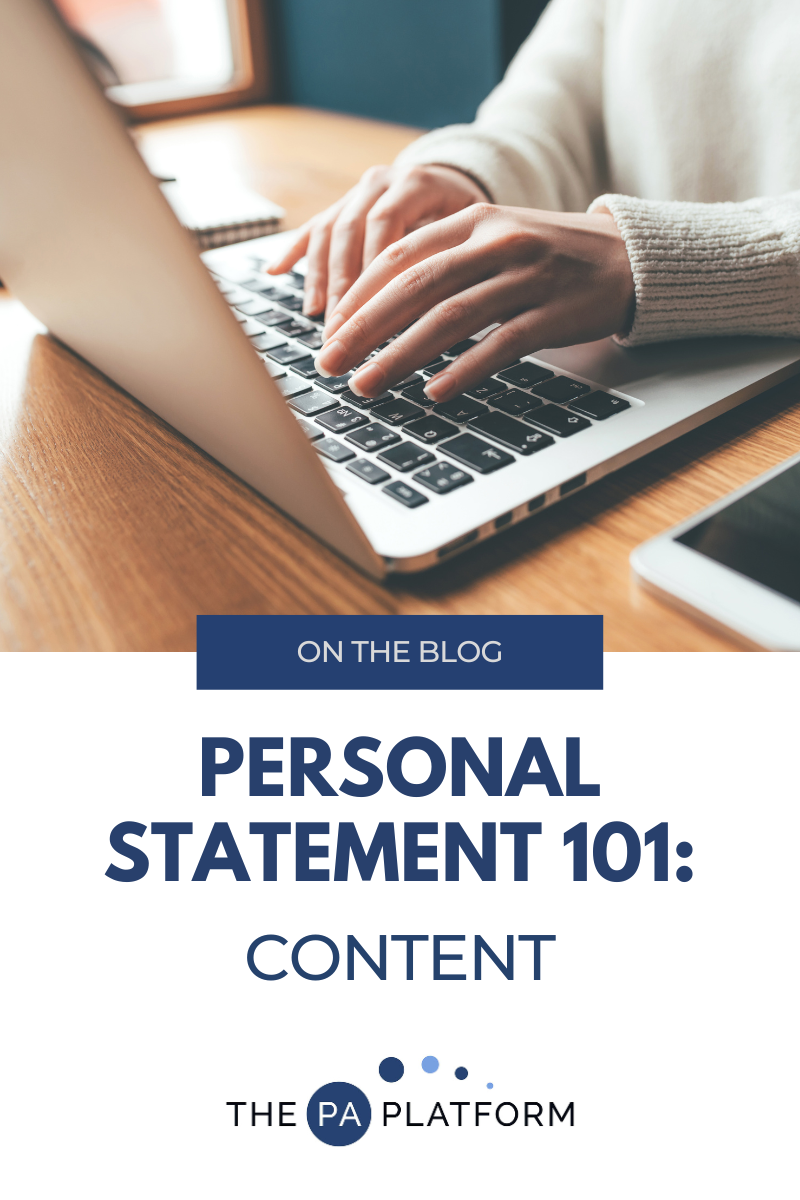I'm so excited to share a post with you from Lorae Schafer, a PA student who is killing it on Instagram (@Lorae.the.pa) and Youtube. If you want to be encouraged and get some great tips, make sure you're following her on social media.
The Do’s and Don’ts of Writing Your Personal Statement
Your personal statement is the ultimate balancing act. In 5,000 characters or less, you are asked to showcase who you are, highlight your strengths, elaborate on your experiences, and showcase why you would make a great PA. Most importantly, it is an opportunity to emphasize what makes you unique and explain why programs should want to turn you into a PA. The prompt seems so simple – yet navigating your response can be a challenging and overwhelming task.
As an applicant, I felt I had to create a strong, memorable personal statement to compensate for an otherwise lackluster application. My GPA was average. My patient care/healthcare experience barely met the minimum, and I wasn’t 100% confident in my letters of recommendation. Heck, my prerequisites weren’t even complete by the time I submitted my application. Overall, I felt like a total work in progress! My saving grace was my ability to write about what I felt made me worthy of PA school.
The personal statement is a powerful tool for communicating your individuality to admissions committees. That’s probably why there is so much pressure to make it perfect. But here’s the thing – you don’t have to be the greatest writer in the world to create a killer essay. All you need to know are the do’s and don’ts to create a solid framework for your personal statement. You can always build up from there!
DO…
Consider using a theme. Admissions committees read hundreds to thousands of personal statements every year. A theme allows you to tie your personal statement together by giving you something to bring all your thoughts back to. Even better, it gives your reader something to remember your essay by. Incorporating a positive theme can help increase your memorability as an applicant.
Draw in the reader. If your first paragraph is off to a slow start, you are setting the tone for an uninteresting essay and a blasé reader. Perhaps the most common way of creating a hook is with an interesting (and relevant) story. Whatever you decide – make the reader want to keep reading.
Be honest and transparent. Writing your personal statement isn’t about what you think the admissions committees want to hear; it’s about staying true to who you are. So, before you answer the prompt, make a simple list of the reasons why YOU want to be a PA – not things you found on the internet or heard from your mentor. Then draw on your own meaningful experiences to back up those reasons. By being honest, your personality should naturally start to shine through.
Edit, edit, edit. Continually revise your essay. Nothing ever comes out perfectly the first time around. Then ask your friends, family, colleagues, and/or mentors to look over your personal statement as well. This is useful in ensuring you have no grammar, punctuation, or spelling mistakes. It is also a great way to validate that your essay is genuine. The more eyes, the better!
DON’T…
Define what a PA is. The admissions committees are reading your personal statement to learn something about you, so don’t waste precious time and space explaining something they already know. Instead, ask yourself how you know you could fulfill those same duties – and why you want to.
Restate your resume. Again, this will not contribute to your application. This is what CASPA is for! Use your essay to explain the “how” and “why” behind your resume. Why did working as a CNA confirm that the PA profession was right for you? How does your experience as an EMT substantiate your capabilities as a future PA?
Detail your life story. Yes, the admissions committees want to know you – but primarily the parts of you that are relevant to PA school. Instead of walking the admissions committees through your path to applying step-by-step, focus on specific experiences. Keep personal details and family struggles to a minimum unless they contribute strongly to why you would make a fantastic PA. Even then, focus the majority of your writing around your non-familial life.
Dwell on mistakes. It is tempting to fill up space justifying a failing grade. You are better off briefly touching on issues like these in no more than a couple sentences. Don’t let yourself be distracted from the task at hand. Stay focused on responding to the prompt, painting a picture of your strengths, and maintaining a positive emphasis. Academic hiccups or other potential red flags in your application can be left to a more thorough discussion at your interview.
Remember – you CAN do this! Just think back on how far you’ve come to be able to apply to PA school. This is just one more challenge along the way.
Lorae graduated from the University of San Diego in 2015 with a degree in Behavioral Neuroscience. She worked as a medical scribe in women's health for two years and is currently a first year PA student at Wake Forest School of Medicine in North Carolina.

















Your personal statement is your chance to demonstrate maturity, address any weaknesses, and showcase your continued dedication to becoming a PA. By making thoughtful revisions to your personal statement and highlighting your progress, you can strengthen your application and increase your chances of acceptance.